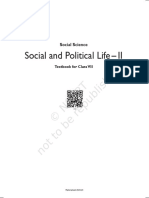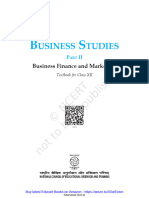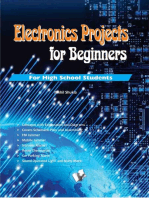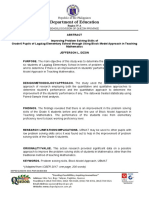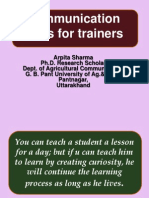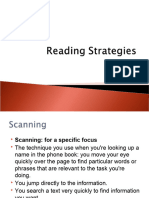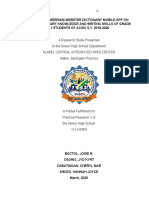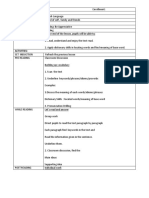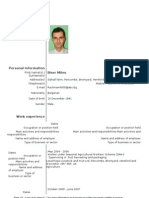Lehe 1 Ps
Lehe 1 Ps
Uploaded by
pspasp213Copyright:
Available Formats
Lehe 1 Ps
Lehe 1 Ps
Uploaded by
pspasp213Original Title
Copyright
Available Formats
Share this document
Did you find this document useful?
Is this content inappropriate?
Copyright:
Available Formats
Lehe 1 Ps
Lehe 1 Ps
Uploaded by
pspasp213Copyright:
Available Formats
Human Ecology and Family Sciences – Part 1
PART I
HUMAN ECOLOGY
AND FAMILY SCIENCES
Textbook for Class XII
Rationalised 2023-24
Prelims.indd 1 9/1/2022 9:20:45 AM
12136 – Human Ecology and Family Sciences Part I ISBN 978-93-5007-768-9 (Part I)
Textbook for Class XII 978-93-5007-769-6 (Part II)
ALL RIGHTS RESERVED
First Edition No part of this publication may be reproduced, stored in a
retrieval system or transmitted, in any form or by any means,
March 2016 Chaitra 1938 electronic, mechanical, photocopying, recording or otherwise
without the prior permission of the publisher.
Reprinted
This book is sold subject to the condition that it shall not, by
February 2018, March 2021 and way of trade, be lent, re-sold, hired out or otherwise disposed
November 2021 of without the publisher’s consent, in any form of binding or
cover other than that in which it is published.
Revised Edition The correct price of this publication is the price printed on
August 2022, Shrawana 1944 this page, Any revised price indicated by a rubber stamp or
by a sticker or by any other means is incorrect and should be
unacceptable.
PD 65T HK
OFFICES OF THE PUBLICATION
© National Council of Educational DIVISION, NCERT
Research and Training, 2016, 2022
NCERT Campus
Sri Aurobindo Marg
New Delhi 110 016 Phone : 011-26562708
108, 100 Feet Road
Hosdakere Halli Extension
Banashankari III Stage
Bengaluru 560 085 Phone : 080-26725740
Navjivan Trust Building
P.O.Navjivan
Ahmedabad 380 014 Phone : 079-27541446
` 250.00
CWC Campus
Opp. Dhankal Bus Stop
Panihati
Kolkata 700 114 Phone : 033-25530454
CWC Complex
Maligaon
Guwahati 781 021 Phone : 0361-2674869
Publication Team
Head, Publication : Anup Kumar Rajput
Division
Chief Production : Arun Chitkara
Officer
Printed on 80 GSM paper with NCERT
watermark Chief Business : Vipin Dewan
Manager
Published at the Publication Division
by the Secretary, National Council of Chief Editor (In charge) : Bijnan Sutar
Educational Research and Training,
Production Assistant : Prakash Veer Singh
Sri Aurobindo Marg, New Delhi 110
016 and printed at Laxmi Print India,
519/1/23, Sansar Compound, Dilshad Cover, Layout Design
Garden Industrial Area, Shahdara, Delhi and Illustrations
110 095 Digital Expressions
Rationalised 2023-24
Prelims.indd 2 9/1/2022 9:20:45 AM
Foreword
The National Curriculum Framework (NCF) 2005 recommends that children’s
life at school must be linked to their life outside the school. This principle
marks a departure from the legacy of bookish learning which continues to
shape our system and creates a gap between the school, home and community.
The syllabi and textbooks developed on the basis of NCF signify an attempt
to implement this basic idea. They also attempt to discourage rote learning
and the maintenance of sharp boundaries between different subject areas.
We hope these measures will take us significantly further in the direction
of a child-centred system of education outlined in the National Policy on
Education (1986).
This initiative can succeed only if all stakeholders – school principals,
parents and teachers – encourage children to reflect on their own learning and
to pursue imaginative activities and questions. We must recognise that, given
space, time and freedom, children generate new knowledge by engaging with
the information passed on to them by adults. We also must remember that a
prescribed textbook is only one of the learning resources for a child, and the
teacher another. Her/his home and her/his environment, her/his life and her/
his peers, all these are resources and sites of learning. Inculcating creativity
and initiative is possible if we perceive and treat children as the chief agents
of their learning, not as receivers of a fixed body of knowledge. These beliefs
imply a considerable change in school routines and mode of functioning.
The book in your hands at present is an example of how a textbook
can be. It is based on NCERT’s resolve to reconstruct knowledge in all
areas from the perspective of the learner and the dynamic socio-economic
realities of contemporary India. The National Focus Group on Gender Issues
in Education, appointed under the auspices of NCF-2005, emphasises the
urgency of incorporating women’s perspective for epistemologically redefining
conventionally defined subjects like home science. We hope that the present
textbook will make this subject free of gender bias and capable of challenging
young minds and teachers for creative study and practical work.
NCERT appreciates the hard work done by the Textbook Development
Committee responsible for this book. We are especially grateful to the members
of the National Monitoring Committee, appointed by the Department of
Secondary and Higher Education, Ministry of Human Resource Development,
for their valuable time and contribution and the sub-committee (National
Review Committee) for Human Ecology and Family Sciences (HEFS) for their
contribution in reviewing the textbook.
Rationalised 2023-24
Prelims.indd 3 9/1/2022 9:20:45 AM
As an organisation committed to systemic reform and continuous
improvement in the quality of its products towards quality learning for all,
NCERT welcomes comments and suggestions which will enable us to undertake
further revision and refinement.
H.K. Senapaty
Director
New Delhi National Council of Educational
February 2016 Research and Training
iv
Rationalised 2023-24
Prelims.indd 4 9/1/2022 9:20:45 AM
Rationalisation of Content in the
Textbooks
In view of the COVID-19 pandemic, it is imperative to reduce
content load on students. The National Education Policy 2020, also
emphasises reducing the content load and providing opportunities
for experiential learning with creative mindset. In this background,
the NCERT has undertaken the exercise to rationalise the textbooks
across all classes. Learning Outcomes already developed by the
NCERT across classes have been taken into consideration in this
exercise.
Contents of the textbooks have been rationalised in view of the
following:
• Overlapping with similar content included in other subject areas
in the same class
• Similar content included in the lower or higher class in the same
subject
• Difficulty level
• Content, which is easily accessible to students without much
interventions from teachers and can be learned by children through
self-learning or peer-learning
• Content, which is irrelevant in the present context
This present edition, is a reformatted version after carrying out the
changes given above.
Rationalised 2023-24
Prelims.indd 5 9/1/2022 9:20:45 AM
Gandhiji’s Talisman
I will give you a talisman. Whenever
you are in doubt or when the self
becomes too much with you, apply the
following test:
Recall the face of the poorest and
the weakest man whom you may have
seen and ask yourself if the step you
contemplate is going to be of any use
to him. Will he gain anything by it?
Will it restore him to a control over
his own life and destiny? In other
words, will it lead to Swaraj for the
hungry and spiritually starving
millions?
Then you will find your doubts and
your self melting away.
vi
Rationalised 2023-24
Prelims.indd 6 9/1/2022 9:20:46 AM
Preface
The textbooks on Human Ecology and Family Sciences (HEFS), hitherto known
as ‘Home Science’, have been developed based on the vision and principles of
the National Curriculum Framework – 2005 of the NCERT. Globally, the field of
Home Science is known by newer nomenclatures but encompasses basically
five domains, namely, Food and Nutrition, Human Development and Family
Studies, Fabric and Apparel, Resource Management, and Communication and
Extension. Each of these domains or specialisations (as referred to in various
colleges and Universities) have grown and matured with expanding horizons,
keeping in tune with the changing needs of individuals, families, industry and
society. Consequently these domains have developed newer thrusts in view
of the evolving job market, and in many Universities have been renamed to
represent their current status and scope in a better way.
All these domains have their specific content and focus that contribute
to the Quality of Life (QoL) of individuals, families and communities in the
global, socio-cultural and socio-economic contexts. Every person is entitled
to a good QoL, and this creates a demand for professionals who can positively
contribute to different arenas and needs of personal and social life – ranging
from basic sanitation, housing, health care for physical and mental well-
being, safety, environmental promotion and protection, clothing, finance and
a host of myriad allied aspects of living, from micro to macro levels. This
obviously creates a challenge for educationists and educational institutions
to train persons to deliver the multifarious services. In this context, HEFS
provides numerous avenues with interdisciplinary perspectives. These include
opportunities to work in industry/corporate sector, teaching at various levels,
research and development, various cadres in public sector, regional, national
and international organisations that work with and for communities as well
as entrepreneurial ventures.
The academic fraternity, professionals working for community development
and those from industry are constantly interacting and shaping the education
and training in these fields. Thus educational programmes offered under
HEFS (Home Science/ Family and Community Sciences) are geared up towards
development of professionals who not only have knowledge and skills, but are
also sensitised to the challenges, needs and concerns related to quality of life,
productivity and sustainable development.
This textbook takes a holistic approach to address the pertinent issues
related to work, employment and careers, keeping quality of life in perspective,
individually and collectively. Hence the first unit and chapter is focussed on life
skills for livelihood, attitudes to work, work challenges, creativity, performance
and productivity, social responsibility and volunteerism. The importance of
flexibility, diversity, adaptation, balance between work, rest and recreation,
enhanced job satisfaction, and importance of occupational health and safety
are dwelt upon. Entrepreneurship versus employment is discussed, especially
Rationalised 2023-24
Prelims.indd 7 9/1/2022 9:20:46 AM
bringing to the fore the opportunities that entrepreneurship provides for those
are interested in initiating innovation and change. While change is desirable, it
is important not to forget our rich traditional heritage of knowledge and skills.
Many of the traditional occupations, when coupled with innovation, modern
perspectives and good marketing, have tremendous economic potential.
The other chapters and units describe the five salient domains of HEFS.
Within each domain, there are several fields that offer ample professional
opportunities and occupational avenues. The syllabus and textbook attempt
to bring to focus the scope and significance of each domain in the present
day scenario, with inputs on knowledge and skills to be acquired and honed,
including use of ICT for not only gathering information but also as part of
practicals, activities and projects in order to be a ‘valued’ professional.
The practicals have been designed to enable learners to gain insights
and also have a bird’s eye view of the tasks and challenges inherent in the
various professional careers and avenues. Considerable emphasis is laid on
‘construction of knowledge’ through field exposure and first-hand experiences.
The exercises and projects would help to encourage critical thinking, develop
analytical and writing skills and eventually inculcate the ‘passion to learn’.
Many insights and ‘seeds’ of information have been ‘sown’. Students and
teachers in partnership can explore, think about, discover and discuss a
variety of topics and issues. Further learning is encouraged through select
exercises and review questions at the end of each unit. Some of the issues
of current concern that have been addressed, could not only be thought
provoking, but also foster sensitivity and social responsibility in the use of
this textbook. Exercises in understanding region-specific opportunities and
available resources have been included to encourage students (with guidance
from their teachers) to understand, appraise and appreciate their own socio-
cultural ethos and locales.
Objectives
The Human Ecology and Family Sciences (HEFS) textbook for Class XII has
been framed to enable the learners to:
1. understand the scope and significance of each domain within HEFS.
2. appreciate the importance of life skills for work, livelihood and careers.
3. become sensitive to the nuances of work vis-à-vis age and gender.
4. appreciate the potential of entrepreneurship and other varied professional
opportunities.
5. make informed career choices.
A feedback questionnaire is given at the end. We will appreciate your comments
and views about various aspects of this textbook. You may use the given
questionnaire or write to us on a plain paper/send e-mail. Your feedback will
help us to improve further reprint editions.
viii
Rationalised 2023-24
Prelims.indd 8 9/1/2022 9:20:46 AM
A Note to the Teachers
Dear Teachers,
You must have noted the radical changes in the organisation of these textbooks,
compared to the conventional way in which Home Science education was
earlier designed and delivered. However, the contents and the focus of the
domains within Home Science (now called HEFS in the context of the revised
NCERT syllabus), essentially remain undiluted. In fact, in the syllabus and
textbook organisation, care has been taken to cover the basics and go further,
to expose students to the newer and emerging horizons of the five domains
– Food and Nutrition, Human Development and Family Studies, Fabric and
Apparel, Resource Management, and Communication and Extension. This
deliberate departure from the earlier convention is to dispel the misconception
about the discipline being limited in focus and scope to domestic science, and
art and craft. The effort is also to create an interest in the field for its varied,
multidisciplinary strengths, both in terms of quality education and potential
for professional avenues.
In each chapter from Unit 2 onwards, the textbook has been designed
to inform the learners about the significance and scope of each domain, the
multiple thrusts that exist and are emerging. Each unit spells out the basic
concepts, requisite knowledge and skills in each thrust area and delineates
the career avenues and the preparation required for them in order to make
informed career choices.
Unit 1 is about work, life skills, careers and livelihoods. It starts with a
description about meaningful work and moves on to point out the need to
balance work with rest and recreation, to ensure a good standard of living
and quality of life. Further, the chapter elaborates on success and happiness
in work life resulting from wholesome attitudes and approaches to work. An
attempt has been made therein to introduce and sensitise youth to ethics,
social responsibility, volunteerism and dignity of labour. In this context, it is
pertinent to discuss the rich heritage of traditional occupations of India, with
a view to informing the students that with creativity and innovation, there
are immense opportunities for a satisfying career. The immense potential of
entrepreneurship as a challenging career avenue is brought to focus to further
the interests of the youth, especially for those who would like to be their own
masters, to create employment for others while being gainfully self-employed.
The unit also delves into the importance of a healthy work environment and the
need to sustain good occupational health, while being aware of occupational
hazards and safety measures required. It is felt that youth of today need to
understand current issues including work in the context of age (child labour
and engaging senior citizens) and gender ( women and work). In this context,
it is felt that the school(s) could invite ‘guest faculty or experts’ to interact
with the students to enable them to obtain first hand realistic information.
Rationalised 2023-24
Prelims.indd 9 9/1/2022 9:20:46 AM
Teachers should note that considerable theoretical inputs are required
for students and learners to gain deeper understanding and appreciation
of the different areas in each domain. Therefore, some basic theoretical
information has been included in each unit. This theory-based content should
provide adequate material for testing students’ achievement in acquisition of
knowledge. Further, based on student interest and capability, and region–
specific resources and facilities, teachers may motivate and help students to
obtain more information in areas and issues of their interest. The inclusion
of review questions, activities, exercises, practicals, field visits and reporting,
are envisaged as opportunities for students to develop reading and writing
skills as well as critical and analytical thinking. Gathering and processing
information is important per se. However, students should be encouraged to
think and discuss the various issues and topics delineated in this textbook
as a means of helping youth to think, construct knowledge and articulate. All
these experiences have been deliberately introduced so that learning may be
meaningful and enjoyable.
It may be noted that in the units, the authors have included several
activities and exercises, which are suitable and would enhance learning as
well as relieve the tedium of classroom instruction. It is expected that teachers
and students would decide upon the number of activities and exercises they
can honestly complete within the academic year. Teachers may encourage
students to do as many as possible in and outside the classroom to ‘fan the
flame’ of curiosity and joyful learning. Use of ICT has been recommended in
these textbooks for seeking information, for making power point presentations,
designing educational and promotional materials. In all units, wherever
possible, teachers are advised to ensure that the students have exposure and
practice with ICT for various purposes.
In addition, a number of inter-disciplinary projects have been included.
Every student should have an opportunity to participate in any one project,
and it is expected that students would have an opportunity to participate in
the chosen project either in groups or in pairs. Since the learners may be
relatively unfamiliar with conducting projects, it is essential that the project
be guided by the teacher throughout, from the planning stage to execution
and report writing.
The syllabii for all chapters delineated in further detail are given herein.
In the process of developing the textbook, the teams have expressed the need
for highlighting and including and deleting some selected issues. Thus, some
modifications have emerged that are indicated in a tabular form.
Rationalised 2023-24
Prelims.indd 10 9/1/2022 9:20:46 AM
Class XII Syllabus printed in Modifications in the Class XII
Class XI textbook textbook
Unit I: Work, livelihood and Unit I: Work, livelihood and career
career; Preparation, choices and
� Quality of Life
selection
� Social Responsibility and
� Work, age and gender
Volunteerism
� Occupational heritage of
� Traditional Occupations of
India
India
� Career options
� Work, Age and Gender
� Entrepreneurship and self
� Attitudes and Approaches to
employment
Work
� Life skills for career building
� Life Skills and Quality of
Work Life
� Work and Work Environment
� Entrepreneurship
Unit II: Career Opportunities Career Opportunities
Scope of Human Ecology and Scope of Human Ecology and
Family Sciences in higher Family Sciences in higher
education and careers education and careers
Major concepts, relevance and Major concepts, relevance and
skills in the following areas skills in the following units
A. Nutrition, Food Science Unit II: Nutrition, Food Science
and Technology and Technology
Specific Careers and Areas Specific Careers and Areas
� Clinical nutrition and � Clinical Nutrition and
dietetics Dietetics
� Public nutrition and health � Public Nutrition and Health
� Catering and food services � Catering and Food Services
management Management
� Food processing and � Food Processing and
technology Technology
� Food quality and food safety � Food Quality and Food Safety
xi
Rationalised 2023-24
Prelims.indd 11 9/1/2022 9:20:46 AM
Class XII Syllabus printed in Modifications in the Class XII
Class XI textbook textbook
B. Human Development and Unit III: Human Development and
Family Studies Family Studies
Specific Careers and Areas Specific Careers and Areas
� Early childhood care and � Early Childhood Care and
education Education
� Guidance and counselling � Guidance and Counselling
� Special education and � Special Education and
support services Support Services
� Support services for children � Management of Support
in difficult circumstances Services, Institutions and
Programmes for Children,
� Management of institutions
Youth and Elderly
and programs for children,
youth and elderly
C. Fabric and Apparel Unit IV: Fabric and Apparel
Specific Careers and Areas Specific Careers and Areas
� Care and maintenance of � Design for Fabric and
fabrics in institutions Apparel
� Design for fabric and � Fashion Merchandising
apparel
� Production and Quality
� Retailing and merchandising Control in Garment Industry
� Production and quality � Textile Conservation in
control in garment industry Museums
� Museumology and textile � Care and Maintenance of
conservation Fabrics in Institutions
xii
Rationalised 2023-24
Prelims.indd 12 9/1/2022 9:20:46 AM
Class XII Syllabus printed in Modifications in the Class XII
Class XI textbook textbook
D. Resource Management Unit V: Resource Management
Specific Careers and Areas Specific Careers and Areas
� Human Resource � Human Resource Management
Management
� Hospitality Management
� Hospitality management
� Ergonomics and Designing of
� Designing of interior and Interior and Exterior Spaces
exterior space
� Event Management
� Event management
� Consumer Education and
� Consumer services Protection
E. Communication and Unit VI: Communication and
Extension Extension
Specific Careers and Areas Specific Careers and Areas
� Management of development � Development Communication
Programmes. and Journalism
� Development communication � Advocacy
and journalism
� Media Management, Design
� Media management and and Production
advocacy
� Corporate Communication and
� Media design and Public Relation
production
� Management of Development
� Corporate communication Programmes
and public relations
xiii
Rationalised 2023-24
Prelims.indd 13 9/1/2022 9:20:46 AM
PRACTICALS and PROJECTS
Class XII Syllabus printed in Modifications in the Class XII
Class XI textbook textbook
Nutrition, Food Science and Nutrition, Food Science and
Technology Technology
1. Qualitative tests on food � Qualitative tests on food
adulteration adulteration
2. Development and preparation � Development and
of supplementary foods for preparation of
nutrition programmes supplementary foods for
3. Planning messages for nutrition programmes
nutrition, health and life � Planning a menu for a
skills using different modes school canteen or midday
of communication for meal scheme
different focal groups
� Modification of a normal
4. Preservation of foods diet to soft diet for elderly
using traditional and / or person
contemporary methods
� Design, Preparation and
5. Packaging and study of shelf Evaluation of a processed
life of the prepared products food product
Human Development and Family Human Development and Family
Studies Studies
6. Preparation and use � Preparation and use
of teaching aids, using of teaching aids, using
indigenous and locally indigenous and locally
available material to available material to
communicate socially communicate socially relevant
relevant messages for messages for children,
children, adolescents and adolescents and adults in the
adults in the community community
7. Conducting mock sessions � Conducting mock sessions
among peers in career among peers in career
guidance, nutrition guidance, nutrition counselling
counseling and personal and personal counselling
counseling under supervision under supervision
xiv
Rationalised 2023-24
Prelims.indd 14 9/1/2022 9:20:46 AM
Fabric and Apparel Fabric and Apparel
8. Preparation of articles � Preparation of articles
using applied textile design using applied textile design
techniques: tie and dye/ techniques: tie and dye/batik/
batik/block printing block printing
9. Application of quality control � Developing a female fashion
techniques in garment figure
industry:
� Application of quality control
a. Fabric inspection techniques in garment
b. Quality of seams industry:
and notions a. Fabric inspection
c. Size labels b. Quality of seams and
d. Packaging notions
10. Care and maintenance of c. Size labels
fabric products: � Care and maintenance of fabric
a. Mending products:
b. Cleaning a. Mending
c. Storage b. Cleaning
Resource Management Resource Management
11. Open an account in bank/ � Observe and critically analyse
post office. Learn basic any event on the basis of the
banking operations (Mock specified criteria.
exercises in the lab with real
� Make a leaflet or a pamphlet
bank forms)
for consumer education (any
one of the following):
12. Application of traditional/ a. CPA (Consumer
contemporary techniques of Protection Act)
home decorations:
b. Consumer
a. Floor and wall responsibilities
decorations
c. Consumer
b. Flower arrangement organisations
c. Other forms of local d. Consumer problems
decorations
� Evaluate an advertisement
xv
Rationalised 2023-24
Prelims.indd 15 9/1/2022 9:20:46 AM
Extension and Communication Communication and Extension
13. Analysis and discussion of � Analysis and disccussion of
print, radio, and electronic
media with reference
to: focus, presentation, – radio
technology and cost – electronic media with
14. Communicating with groups reference to: focus,
on any one of the following presentation, technology
themes: and cost
a. Social messages- gender
equality, AIDs, female
foeticide, child labour,
rights abuse and other
such themes
b. Scientific fact / discovery
c. Any significant incident/
event
xvi
Rationalised 2023-24
Prelims.indd 16 9/1/2022 9:20:46 AM
Class XII Syllabus printed in Modifications in the Class XII
Class XI textbook textbook
Projects Projects
Any one of the following may be Note: Any one of the following
undertaken and evaluated: projects may be undertaken and
evaluated:
1. a. Analysis of traditional
occupations prevalent 1. a. Analysis of traditional
in one’s local area, their occupations prevalent
beginnings, present status in one’s local area, their
and challenges faced beginnings, present
status and challenges
b. Analysis of gender
faced
roles, entrepreneurial
opportunities, and b. Analyse gender roles,
future careers and family entrepreneurial
participation opportunities and future
careers and family
participation
2. Documentation of any 2. Documentation of any
public/mass campaign being public/mass campaign being
implemented in own area, implemented in own area,
with reference to: with reference to:
a. Purpose of campaign a. Purpose of campaign
b. Focal group b. Focal group
c. Modalities of c. Modalities of
implementation implementation
d. Stakeholders involved d. Stakeholders involved
e. Media and methods used e. Media and methods used
Comment on the relevance of the Comment on the relevance of the
campaign. campaign.
3. Study of an integrated 3. Study of an integrated
community based programme community-based,
being implemented in own nutrition/health programme
area, with reference to: being implemented in own
a. Programme objectives area, with reference to:
a. Programme objectives
b. Focal group
b. Focal group
c. Modalities of
implementation c. Modalities of
implementation
d. Stakeholders involved
d. Stakeholders involved
xvii
Rationalised 2023-24
Prelims.indd 17 9/1/2022 9:20:46 AM
4. Visit to the neighbouring 4. Visit to the neighbouring
areas and interviews with areas and interviews with
two adolescents and two two adolescents and two
adults regarding their adults regarding their
perception of persons with perception of persons with
special needs special needs
5. Take a profile of any one 5. Profile any one person with
person with special needs, special needs, child or
child or adult: to find out adult, to find out their diet,
their diet, clothing, activities, clothing, activities, physical
physical and psychological and psychological needs
needs
6. Plan and execute any event
6. Observe and document any in your school. Evaluate the
event in your school/ home same with respect to:
or neighbourhood. Evaluate
a. Its relevance
the same with respect to:
b. Resource availability and
a. Relevance
mobilisation
b. Resource availability
c. Planning and execution
and mobilisation
of the event
c. Planning and
d. Financial Implications
execution of the event
e. Feedback from
d. Financial implications
stakeholders
e. Feedback from
f. Suggest modifications for
stakeholders
the future.
Suggest modifications for the
7. Planning messages for
future.
nutrition, health and life
skills using different modes
of communication for
different focal groups.
8. Market survey of processed
foods, their packaging and
label information.
xviii
Rationalised 2023-24
Prelims.indd 18 9/1/2022 9:20:46 AM
Textbook Development Committee
Chief Advisors
Ravikala Kamath, Professor (Retd.), Department of Post Graduate Studies
and Research in Home-Science, Faculty of Home Science, SNDT Women’s
University, Mumbai
Shobha A. Udipi, Professor, Department of Food Science and Nutrition, Faculty
of Home-Science, SNDT Women’s University, Mumbai, Maharashtra
Members
Annu Jacob Thomas, Professor, School of Gender and Development Studies,
Indira Gandhi National Open University, New Delhi
Archna Bhatnagar, Professor, Department of Post Graduate Studies and
Research in Home Science, SNDT Women’s University, Faculty of Home
Science, Mumbai, Maharashtra
Archana Kumar, Associate Professor, Department of Development
Communication and Extension, Lady Irwin College, University of Delhi, New
Delhi
Arvind Wadhwa, Reader (Retd.), Department of Food and Nutrition, Lady
Irwin College, University of Delhi, New Delhi
Asha Rani Singh, PGT, Home Science, Laxman Public School, New Delhi
Bhavna K. Verma, Associate Professor, Department of Fashion Technology,
National Institute of Fashion Technology, New Delhi
Hitaishi Singh, Associate Professor, Department of Home Science, R.C.A. Girls
(P.G.) College, Mathura, Dr. B.R. Ambedkar University, Uttar Pradesh
Indu Sardana, Former TGT, Home Science, Sarvodaya Kanya Vidyalaya,
Malviya Nagar, New Delhi
Maneesha Shukul, Professor, Department of Home Management, Faculty
of Family and Community Sciences, M.S. University of Baroda, Vadodara,
Gujarat
Meenakshi Mital, Associate Professor, Department of Resource Management
and Design Application, Lady Irwin College, University of Delhi, New Delhi
Rationalised 2023-24
Prelims.indd 19 9/1/2022 9:20:46 AM
Nandita Chaudhary, Associate Professor, Department of Human Development
and Childhood Studies, Lady Irwin College, University of Delhi, New Delhi
Neerja Sharma, Associate Professor, Department of Human Development and
Childhood Studies, Lady Irwin College, University of Delhi, New Delhi
Padmini Ghugre, Associate Professor, Department of Food Science and
Nutrition, Faculty of Home Science, SNDT Women’s University, Mumbai,
Maharashtra
Puja Gupta, Associate Professor, Department of Resource Management and
Design Application, Lady Irwin College, University of Delhi, New Delhi
Rekha Sharma Sen, Professor, Centre for Early Childhood Development and
Research, Jamia Millia Islamia, New Delhi
Sarita Anand, Associate Professor, Department of Development Communication
and Extension, Lady Irwin College, University of Delhi, New Delhi
Shobha Nandwana, Associate Professor, Department of Human Development
and Family Studies, College of Home-Science, Maharana Pratap University of
Agriculture and Technology, Udaipur, Rajasthan
Simmi Bhagat, Associate Professor, Department of Fabric and Apparel Science,
Lady Irwin College, University of Delhi, New Delhi
Sunanda Chande, Principal (Retd.), SVT College of Home-Science, SNDT
Women’s University, Mumbai, Maharashtra
Sushma Goel, Associate Professor, Department of Resource Management and
Design Application, Lady Irwin College, New Delhi
Sushma Jaireth, Professor (Retd.), Department of Gender Studies, NCERT,
New Delhi
Veena Kapur, Associate Professor (Retd.), Department of Fabric and Apparel
Science, Lady Irwin College, University of Delhi, New Delhi
Coordinator
Tannu Malik, Assistant Professor, Department of Education in Social Sciences,
NCERT, New Delhi
xx
Rationalised 2023-24
Prelims.indd 20 9/1/2022 9:20:46 AM
Acknowledgements
The National Council of Educational Research and Training (NCERT)
acknowledges the valuable contribution of the individuals and organisations
involved in the development of this textbook.
We gratefully acknowledge contribution of Mariamma Varghese,
Professor and Former Vice-Chancellor, SNDT Women’s University; Prerna
Mohite, Professor, Former Dean and Head, Faculty of Home Science,
S.V. University of Baroda; Sabiha Vali, Professor, Dean and Head, Faculty
of Home Science, Nagpur University; Veena Gupta, Associate Professor
(Retd.), Department of Fabric and Apparel Science, Lady Irwin College,
New Delhi; and Pratima Singh, Assistant Professor, Department of Resource
Management, Institute of Home Economics, New Delhi for their expert review,
comments and suggestions.
The NCERT is also thankful to Sushma Jaireth, Former Head and Professor
(Retd.), Department of Gender Studies, NCERT, New Delhi; Neerja Sharma,
Associate Professor, Lady Irwin College, University of Delhi, New Delhi;
Simmi Bhagat, Associate Professor, Lady Irwin College, University of Delhi,
New Delhi; Seema Puri, Associate Professor, Institute of Home Economics,
University of Delhi, New Delhi; Renu Arora, Associate Professor, Institute of
Home Economics, University of Delhi, New Delhi; and Sarita Anand, Associate
Professor, Institute of Home Economics, University of Delhi, New Delhi for
evaluation and updating the textbook for the academic Session 2021–22.
Special thanks are due to Reetu Chandra, Assistant Professor, DEE,
NCERT, New Delhi for co-ordinating the evaluation and update of the textbook.
The photographs in the textbook and on the cover page (front) are from
the Department of Food Science and Nutrition, SNDT Women’s University;
from the Department of Fabric and Apparel Science, Lady Irwin College,
Delhi University, and the cover page (front and back) from the Department of
Women’s Studies, NCERT are duly acknowledged.
Rationalised 2023-24
Prelims.indd 21 9/1/2022 9:20:46 AM
xxii
Rationalised 2023-24
Prelims.indd 22 9/1/2022 9:20:46 AM
Contents
Part – I
Foreword iii
Rationalisation Content v
Preface vii
A Note to the Teachers ix
Unit I Work, Livelihood and Career 1
Chapter 1 Work, Livelihood and Career 2
Unit II Nutrition, Food Science and Technology 29
Chapter 2 Clinical Nutrition and Dietetics 32
Chapter 3 Public Nutrition and Health 46
Chapter 4 Food Processing and Technology 61
Chapter 5 Food Quality and Food Safety 75
Unit III Human Development and Family Studies 99
Chapter 6 Early Childhood Care and Education 103
Chapter 7 Management of Support Services, Institutions and
Programmes for Children, Youth and Elderly 116
References for Further Reading 134
Appendix Syllabus 135
Feedback Questionnaire 150
xxiii
Rationalised 2023-24
Prelims.indd 23 9/1/2022 9:20:46 AM
Contents of Part – II
Unit IV Fabric And Apparel
Chapter 11 Design for Fabric and Apparel
Chapter 12 Fashion Design and Merchandising
Chapter 13 Care and Maintenance of Fabrics in Institutions
References
Unit V Resource Management
Chapter 14 Hospitality Management
Chapter 15 Consumer Education and Protection
References
Unit VI Communication and Extension
Chapter 16 Development Communication and
Journalism
Chapter 17 Corporate Communication and Public Relations
References
Appendix Projects
Rationalised 2023-24
Prelims.indd 24 9/1/2022 9:20:46 AM
You might also like
- TBL Characteristics: A A B B C CDocument8 pagesTBL Characteristics: A A B B C CIviennyNo ratings yet
- TPACK Explained: The Seven Components of TPACKDocument3 pagesTPACK Explained: The Seven Components of TPACKXuan Qiu0% (1)
- Lehe1ps (1) MergedDocument231 pagesLehe1ps (1) MergedJeevansh WadhwaNo ratings yet
- Lehe 1 PsDocument24 pagesLehe 1 PsAmit Prakash SahooNo ratings yet
- Business Studies: Textbook For Class XIDocument10 pagesBusiness Studies: Textbook For Class XIMonu KumarNo ratings yet
- Polity 6thDocument96 pagesPolity 6thMandeep BeniwalNo ratings yet
- Kehe 2 PsDocument14 pagesKehe 2 Pstimeecoffee46No ratings yet
- Politics 6thDocument96 pagesPolitics 6thRadhika GoelNo ratings yet
- Jess 4 PsDocument14 pagesJess 4 PsopNo ratings yet
- Jess 4 PsDocument14 pagesJess 4 PsYESHWANTH KANIKENo ratings yet
- NCF-2023Document580 pagesNCF-2023SOMESH SPARC INDIANo ratings yet
- NCFSE-2023-August_2023Document580 pagesNCFSE-2023-August_2023SOMESH SPARC INDIANo ratings yet
- 2023-24 NCERT 10 SST (Pol Sci) Complete BookDocument88 pages2023-24 NCERT 10 SST (Pol Sci) Complete Bookamandeep63kaurNo ratings yet
- Keph2ps Merged PDFDocument164 pagesKeph2ps Merged PDFNimal 007No ratings yet
- Mathematics IDocument148 pagesMathematics IFilipe GomesNo ratings yet
- Aejm 1 PsDocument16 pagesAejm 1 PsJaydeep BhawalNo ratings yet
- Keac 1 PsDocument12 pagesKeac 1 Psvishnujoshi4269No ratings yet
- Class - 6 Social Science New BookDocument241 pagesClass - 6 Social Science New BookKasiram SundarNo ratings yet
- Fees 1 PsDocument20 pagesFees 1 Pskumarsubham7148719No ratings yet
- Fess 3 PsDocument16 pagesFess 3 PsW1z ArdNo ratings yet
- Science (Class 6)Document136 pagesScience (Class 6)Sriram PrustyNo ratings yet
- Fesc 1 PsDocument12 pagesFesc 1 Psvempati srilathaNo ratings yet
- English NcertDocument152 pagesEnglish NcertYasir SaeedNo ratings yet
- Gehc 1 PsDocument12 pagesGehc 1 PsRaghavendra Rao TholetiNo ratings yet
- Class 7 - SociologyDocument126 pagesClass 7 - SociologyHarshit DayalNo ratings yet
- Health and Physical Education: Textbook For Class XIDocument10 pagesHealth and Physical Education: Textbook For Class XIShivam YadavNo ratings yet
- NCERT-Accountancy Book 1Document288 pagesNCERT-Accountancy Book 1KalyanNo ratings yet
- Lefa 1 PsDocument12 pagesLefa 1 Psdikshakri1125No ratings yet
- Lefa 1 PsDocument12 pagesLefa 1 PsGauri MittalNo ratings yet
- Class VI MathsDocument304 pagesClass VI Mathskartiksingh82712No ratings yet
- Business Studies Part IIDocument104 pagesBusiness Studies Part IIHome Grown CreationNo ratings yet
- Kebs 1 PSGVDocument10 pagesKebs 1 PSGVbirovishalNo ratings yet
- Lesy 1 PsDocument14 pagesLesy 1 PsBrijnandan KumarNo ratings yet
- NCERT Class 8 GeographyDocument64 pagesNCERT Class 8 GeographyvikbhartiNo ratings yet
- Human Ecology and Family Sciences: Textbook For Class XIIDocument22 pagesHuman Ecology and Family Sciences: Textbook For Class XIIdhhfdkhNo ratings yet
- Iict 1 PsDocument10 pagesIict 1 PsS RoyNo ratings yet
- Pdf24 MergedDocument132 pagesPdf24 Mergedcoolakshat3664No ratings yet
- NCERT Class 12 Business Studies Book (Part II)Document100 pagesNCERT Class 12 Business Studies Book (Part II)ajaytp496No ratings yet
- Prsentation 1Document14 pagesPrsentation 1Madhav ManjulalNo ratings yet
- Health and Physical EducationDocument348 pagesHealth and Physical Educationyusuf DanishNo ratings yet
- PRELIMSDocument14 pagesPRELIMSJ.A.S SANTHOSHNo ratings yet
- History 7 THDocument120 pagesHistory 7 THTushar KumarNo ratings yet
- Keac 1 PsDocument12 pagesKeac 1 PsS'il Vous PlaîtNo ratings yet
- Usiness Tudies: Business Finance and MarketingDocument10 pagesUsiness Tudies: Business Finance and MarketingAyushNo ratings yet
- Kehp 1 PsDocument10 pagesKehp 1 Pstaufiqshaikhh67866No ratings yet
- Physical Education NCERT - 24Document348 pagesPhysical Education NCERT - 24TanishNo ratings yet
- Sociology 12Document151 pagesSociology 12majhimoni.2020No ratings yet
- Lesy 1 PsDocument14 pagesLesy 1 PsABHIMAT PANDEYNo ratings yet
- Hess2ps PDFDocument12 pagesHess2ps PDFAtharva ghogaleNo ratings yet
- Words and ExpressionsDocument152 pagesWords and ExpressionsDevesh Agarwal IT Manager, BharniNo ratings yet
- Class 11 Complete Book of Biotechnology PDFDocument336 pagesClass 11 Complete Book of Biotechnology PDFAsif KhanNo ratings yet
- Kebt 1 PsDocument12 pagesKebt 1 PsRajeev AnnavaramNo ratings yet
- Iict 1 PsDocument10 pagesIict 1 PsrohitNo ratings yet
- Ps Prelims BookDocument12 pagesPs Prelims Bookdavelkiller69No ratings yet
- NCERT Bio Class 11thDocument12 pagesNCERT Bio Class 11thLukesh SadhNo ratings yet
- Monitoring Microservices and Containerized Applications: Deployment, Configuration, and Best Practices for Prometheus and Alert ManagerFrom EverandMonitoring Microservices and Containerized Applications: Deployment, Configuration, and Best Practices for Prometheus and Alert ManagerNo ratings yet
- Environmental Safeguard Monitoring Field Kit: Project Implementation Directorate, NepalFrom EverandEnvironmental Safeguard Monitoring Field Kit: Project Implementation Directorate, NepalNo ratings yet
- Electronics Projects for Beginners: Nnew innovative projects for high school studentsFrom EverandElectronics Projects for Beginners: Nnew innovative projects for high school studentsRating: 5 out of 5 stars5/5 (1)
- Electrical & Electronics Projects: New projects for senior school studentsFrom EverandElectrical & Electronics Projects: New projects for senior school studentsNo ratings yet
- EPortfolio-SIQUIG, BUENAFLOR, CAMALESDocument72 pagesEPortfolio-SIQUIG, BUENAFLOR, CAMALESCherryl SiquigNo ratings yet
- Google Classroom ThesisDocument45 pagesGoogle Classroom ThesisMonica MendozaNo ratings yet
- Plan de Lectie Cls 6Document4 pagesPlan de Lectie Cls 6ioneladzidzakNo ratings yet
- Rubric Profile EssayDocument3 pagesRubric Profile Essayapi-272613959No ratings yet
- Research Methodology: Details of Course Content and Allotted TimeDocument3 pagesResearch Methodology: Details of Course Content and Allotted TimeVineeth SivarajNo ratings yet
- Issues and Challenges in Science Education Research5Document4 pagesIssues and Challenges in Science Education Research5Basikal TuaNo ratings yet
- Kto12 Daily Lesson Log: School: Grade Level: Teacher: Learning Area: Teaching Dates: Quarter/WeekDocument3 pagesKto12 Daily Lesson Log: School: Grade Level: Teacher: Learning Area: Teaching Dates: Quarter/WeekGerald E Baculna100% (2)
- Mapeh: Music - Arts - Physical Education - HealthDocument13 pagesMapeh: Music - Arts - Physical Education - Healthmarvin aguban100% (1)
- Reading Lesson PlanDocument5 pagesReading Lesson Planapi-427935928No ratings yet
- Local Media5299178365155946148Document13 pagesLocal Media5299178365155946148Wyn Mik0% (2)
- Constructivist ApproachDocument10 pagesConstructivist ApproachDanny GarciaNo ratings yet
- Department of Education: Republic of The PhilippinesDocument12 pagesDepartment of Education: Republic of The PhilippinesLovely Joy RomanoNo ratings yet
- Communication Skills For TrainersDocument26 pagesCommunication Skills For TrainersARPITANo ratings yet
- Survey Questionnaire - Ms. VanessaDocument3 pagesSurvey Questionnaire - Ms. Vanessajerickrivera02No ratings yet
- Lesson 2Document5 pagesLesson 2Honey Jane MonteroNo ratings yet
- Lecture-10 (Reading Strategies)Document10 pagesLecture-10 (Reading Strategies)Eshrat Tarabi Shimla 2211281030No ratings yet
- Disciplines and Ideas in The Social SciencesDocument31 pagesDisciplines and Ideas in The Social SciencesChristian Rodriguez GagalNo ratings yet
- Course Evaluation Kac3013 - A212Document10 pagesCourse Evaluation Kac3013 - A212Ying Ping SuNo ratings yet
- Cover PageDocument26 pagesCover PageJELYN BACTOLNo ratings yet
- RPH SelasaDocument4 pagesRPH SelasaamriaNo ratings yet
- Challenging Moments of Novice Teachers: Survival Strategies Developed Through ExperiencesDocument22 pagesChallenging Moments of Novice Teachers: Survival Strategies Developed Through ExperiencesRoxana MarinNo ratings yet
- RRL FDocument9 pagesRRL Fjennierubyjane kimNo ratings yet
- CV - Biser Milev-EnDocument3 pagesCV - Biser Milev-EnBiser MilevNo ratings yet
- Happy Campers Lesson PlanDocument16 pagesHappy Campers Lesson Plangabriella56100% (1)
- Quarterly Report Utilization of Definitive Budget of Work 1Document36 pagesQuarterly Report Utilization of Definitive Budget of Work 1Jerica Mae A. Briones0% (1)
- FS1 Activity 5Document8 pagesFS1 Activity 5AirabellNo ratings yet
- Webinar WorksheetsDocument3 pagesWebinar WorksheetsetwinningNo ratings yet
- School Development Plan Overview 2021 22Document1 pageSchool Development Plan Overview 2021 22MARYCON G. GIRASOLNo ratings yet
























